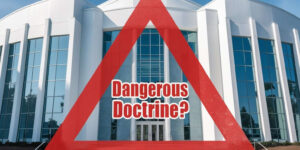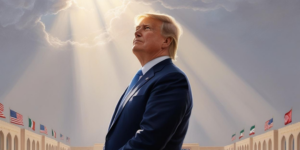Has the Church Made the ‘Big 3’ Changes Since COVID Started?
COVID-19 began approximately two years ago. I wrote a commentary shortly thereafter and was amazed as hundreds of thousands of pastors and people read the article. Today I wonder how much has been put into practice.
Join me on a journey of reviewing what was put forth then and hopefully reflecting on the progress we’ve made. When COVID and all its variants finally disappear, will we find the church more biblical as the bride “who has made herself ready?” (Rev. 19:7b)
2020, When Everything Began to Change
This is not the end of the world but the end of an era. Sequestered in our “bunkers,” we’ve been surveying the situation and as Christians, we shouldn’t succumb to understandable sentiment: “Let’s hang in there so we can soon resume everything the way it was.”
After the flood, everything changed. After World War II, everything changed. After 9/11, everything changed. It is not an overstatement to say that after the COVID crisis, everything will change.
The economy. Professional sports. Health care. Hollywood. Jobs. School. Travel. Childcare. Shopping. Youth athletics. Campaigning. Restaurants. Military. Entertainment. Elections. College. Cruises. Funerals. All have been impacted dramatically and permanently. There’s no “going back to Kansas”—constant change is here to stay.
We dare not leave out church. Scores sense this season of divine disruption is a “dress rehearsal.” God is purifying, developing endurance and laying out lessons so we’re better prepared for the “last days’ perilous times” (2 Tim. 3:1). In the meantime, we’re reflecting, recalibrating and resetting to not miss this unexpected, unbelievable teachable moment.
Defining Moment
My previous defining moment came during the 1970s Jesus Movement. Teaching at a gathering of 2,000 young people near the White House, I had a “woke” moment with our team. Would we maintain business as usual, with the successful weekly teaching service (diluting the New Testament model for church) or make changes to align with Scripture?
We finally embraced the latter as pioneers, not settlers. This eventually birthed a 3,000-plus member church, then a movement of over 60 churches in the U.S. and abroad.
In our current watershed moment, when so much has been brought to a standstill, many leaders believe the church needs to make radical adjustments. I submit the following three areas:
1. Deconstruction: We need to deconstruct our prevalent gospel presentation to highlight repentance, Lordship and the kingdom of God as they are so evident in the Gospels, Acts and Epistles. There simply is no biblical basis for a “Jesus as Savior only” message. The content of our message determines the quality of our converts! And if we want New Testament results, we have to recover the New Testament pattern.
“These men who have turned the world upside down have come here also… They are all acting contrary to the decrees of Caesar saying that there is another king, Jesus” (Acts 17:6-7, MEV).
2. Distribution: God’s blueprint in Ephesians 4:11-16 reveals: Church is not a building but a “body”; Christianity is not an auditorium-centered, spectator sport with leaders given only for educating (or entertaining) but “for the equipping of the saints for the work of service”; the fivefold ministries are essential, not optional, so “every part effectively does its work and grows, building itself up in love.”
Ministry must be distributed throughout the body of believers. Christians, all having God-ordained ministries, must discover and develop their gifts (21 cited in Scripture), then be deployed and distributed outside buildings into life.
The COVID crisis can accelerate God’s original purpose by thrusting us out of buildings when they are closed.
3. Decentralization: The church must be decentralized to express the New Testament model that Christianity is not merely a meeting to attend but a life to be shared. The church is not built primarily on services but relationships (Acts 2:42-47). And God is first and foremost concerned with the quality of our work, not the quantity, for it will all be tested by fire in the final judgment to either “receive a reward” or see it be “burned” (1 Cor. 3:10-15).
Team ministry is the New Testament pattern with a plurality in the leadership. If a church is personality-centered with only “one-man ministry,” what happens when the central figure can’t function or departs? History is replete with ministries ending when this happens.
God’s Ways and Means
The major intervention the church has experienced in this pandemic has been this decentralization. Coincidental or providential? Is this God’s “ways and means committee” demonstrating He has ways to show He means business about accomplishing His purposes?
This reminds us of the experience of early Christians amidst crisis in Acts 8. Remember, it resulted in expansive evangelism!
The late Yonggi Cho, retired pastor of the 830,000-member Yoido Full Gospel Church in Seoul, South Korea, said prayer (“My secret is simple: I pray and I obey!”) and decentralized home cell groups was key to their explosive growth. When the Korean War crisis occurred in 1950, as North Korean communists invaded South Korea (Seoul changed hands four times, church buildings were destroyed and his leadership removed), they reset their model so if they couldn’t gather collectively in a building, they could continue on with “no break in the cadence” via relationship-centered home cells.
This is the two-winged model from Acts. “And continuing daily with one mind in the temple and breaking bread from house to house, they ate their food with gladness and simplicity of heart, praising God and having favor with all the people. And the Lord added to the church daily those who were being saved” (Acts 2:46-47).
In the early 1980s, apostolic evangelist Bob Weiner launched an outreach in Manila that was then entrusted to my friend, Steve Murrel. Today, Steve, who playfully calls himself the “reluctant pastor,” serves with a Filipino leadership team overseeing the 91,000-member Victory Metro Manila Church, which basically follows this same decentralized approach. (Note: Steve told me it’s difficult to know the exact numbers currently because of very restrictive lockdowns.) They have met weekly in 20-plus locations (no video sermons) alongside over 10,000 fellowship gatherings dispersed throughout the city.
They followed this same relational and discipling pattern in planting additional churches in over 100 Philippine cities with over 50,000 weekly attendance and 5,000 fellowship groups. (Steve was “reluctant” to share these stats but yielded at my encouragement.)
Here’s the Deal: Let’s push the pause button here and ask ourselves, “Have we made necessary changes to more accurately represent authentic New Testament church life?” Are we merely a sermon-centered assembly or a growing, evangelizing, multiplying body of believers—a true New Testament church? Next time, let’s go even deeper and examine the actual essentials from Scripture for a local church. {eoa}
Read articles like this one and other Spirit-led content in our new platform, CHARISMA PLUS.






































